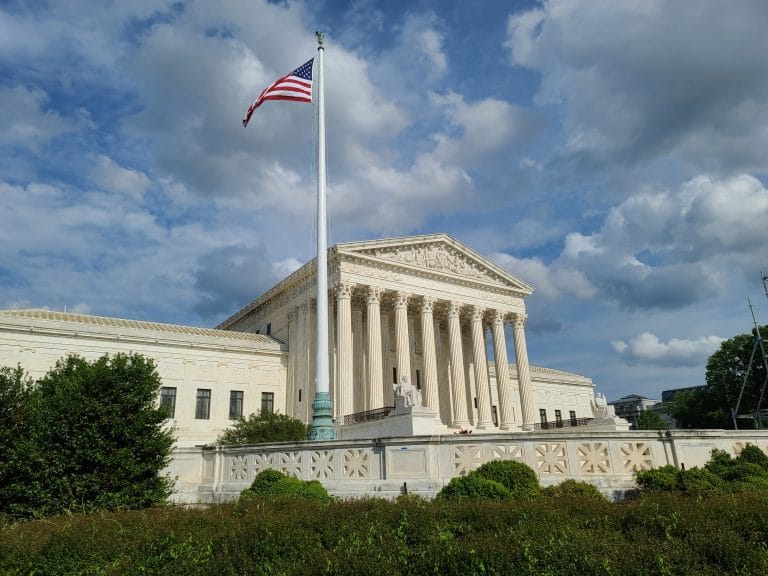With oral arguments in the Court’s next big Second Amendment case less than a month out, all eyes are on how the two sides plan to argue United States v. Rahimi.
We reviewed the Government’s brief when it came out in August. Now, let’s look at Defendant Zackey Rahimi’s newly filed arguments with the Court. His brief lays out the leading critique of the domestic violence restraining order gun ban he was charged with violating. Unsurprisingly, his lawyers would like the High Court to uphold the Fifth Circuit ruling striking down that law as unconstitutional and vacating Rahimi’s conviction.
“This Court should affirm the decision below because it faithfully applied the holdings and reasoning of District of Columbia v. Heller and New York State Rifle & Pistol Ass’n v. Bruen,” the brief opens.
The brief primarily accuses the Government of failing to properly engage with the text, history, and tradition test required under Bruen in its justification for 18 U.S.C. § 922(g)(8). The brief asserts that’s because America’s Founding Era approach to individuals considered part of “the People” protected by the Second Amendment foreclosed categorical disarmament.
“The Second Amendment protects a U.S. citizen’s right to keep firearms within the home for self-defense and defense of others. Section 922(g)(8) severely punishes any exercise of that right,” Rahimi’s lawyers wrote. “Because there is no historical tradition of any similar restriction, the law is unconstitutional on its face.”
Domestic Violence and the Founding
Contrary to the assertions of the Government and several of its supporting amici, Rahimi’s brief argued that the issue of domestic violence was taken seriously around the time of the Second Amendment’s ratification. But, as is relevant for the Bruen test, their approach didn’t include gun bans.
“In the 17th, 18th, and early 19th centuries, Americans recognized the scourge of domestic violence and utilized a variety of legal and extra-legal mechanisms to punish, prevent, and deter it,” the brief reads. “None of those mechanisms involved disarmament or firearm bans.”
His lawyers argued that surety laws—whereby an individual suspected of being a risk to the peace was forced to post a bond as a guarantee of good behavior—were commonly applied to the husbands of women who informed a local justice of the peace of ongoing abuse. They also cited the early liberalization of divorce laws in certain states to allow for “absolute divorce on the grounds of cruelty.” Finally, they pointed to more informal practices carried out by family and community members to address domestic violence, namely sheltering battered women and public shaming rituals for abusers.
But the brief notes none of the remedies for abuse had anything to do with denying access to firearms or otherwise restricting gun rights.
“All these responses differed materially from § 922(g)(8) because none banned or even restricted firearm possession,” Rahimi’s legal team wrote. “As explained below, American jurisdictions simply did not ban firearm possession for citizens who retained their position in the political community.”
Historical Disarmament Laws
The brief’s overarching position on historical analogues for 922(g)(8) contends that governments around the time of the Founding had an understanding that privately owned guns specifically for use in the home represented a “zone of immunity” with respect to firearms regulations. It also suggests that many historical instances of disarming certain classes of people were done under the assumption that those people fell outside the political community. Therefore, all of the Government’s offered analogues for the modern ban on gun possession by those under domestic violence restraining orders differ in “how” and “why” they impact the right to keep and bear arms since they primarily either regulated public carry or disarmed groups considered outside of “the People.”
The brief also criticized the citation of often bigoted historical laws that disarmed certain groups—such as Native Americans, enslaved and free blacks, multiracial people, loyalists, Quakers, and Catholics—as a potential historical analogue.
“The Government and its amici overlook the most significant point: laws banning firearm possession by disfavored categories of people have invariably attended a broader effort to deny the political and civil rights of the affected class,” the brief reads. “As the Fifth Circuit recognized, these bigoted laws were ‘targeted at groups excluded from the political community—i.e., written out of ‘the people’ altogether.'”
“Consider the Kentucky law cited on page 15 of the Public Health Researchers and Lawyers’ Amicus Brief, which banned every ‘negro, mulatto, [and] Indian whatsoever’ from keeping any gun, club, or other ‘offensive or defensive’ weapon,” the brief continued. “This type of law says nothing about ‘the right to keep and bear arms.’ Enslaved people and free blacks were, at that time and place, entirely excluded from the political community. The same legislation forbade free blacks and multiracial people from exercising other rights of citizenship: giving testimony in any case involving at least one white party; meeting, in groups of five or more at someone else’s plantation or quarters; and ‘lifting his or her hand in opposition to’ any white person, on pain of ‘thirty lashes.'”
The brief extends this same argument to historical laws targeting the gun rights of Catholics, Loyalists, and rebels to underscore that such laws were passed not of a finding or perception of “dangerousness” but out of a bigoted understanding of who was and was not included in the American political community.
Addressing the Heller Dicta
Rahimi also responded to the argument, which the Government relied on in its brief to the Court, that the Supreme Court’s own words in previous Second Amendment cases suggest that the right to keep and bear arms is limited to “law-abiding, responsible citizens” and that certain gun bans are therefore “presumptively lawful.” It argued that the Bruen decision and the specific Second Amendment legal test it articulated overruled those non-binding statements, and now courts are required to analyze firearm prohibitions individually using the test.
“The Government cannot meet its burden by pointing to Heller’s ‘felon’ dictum or to other bans that first appeared in the 20th century,” the brief states. “Bruen put a stop to this. The original meaning of the Second Amendment must be determined exclusively using the text and the historical tradition of firearm regulations adopted near the time of ratification—not with assumptions or dicta.”
“Said another way, Heller’s tentative ‘presumptively lawful’ categories are not valid bases for constitutional comparison,” it continued.
Ultimately, the brief takes a narrow view of what constitutes a valid historical analogue for modern-day disarmament.
“Despite casting an incredibly broad net, the Government has yet to find even a single American jurisdiction that adopted a similar ban while the founding generation walked the earth,” Rahimi’s brief said. “The Government cites no laws punishing members of the American political community for possessing firearms in their own homes based on dangerousness, irresponsibility, crime prevention, violent history or inclination, or any other character trait or legislative goal.”






